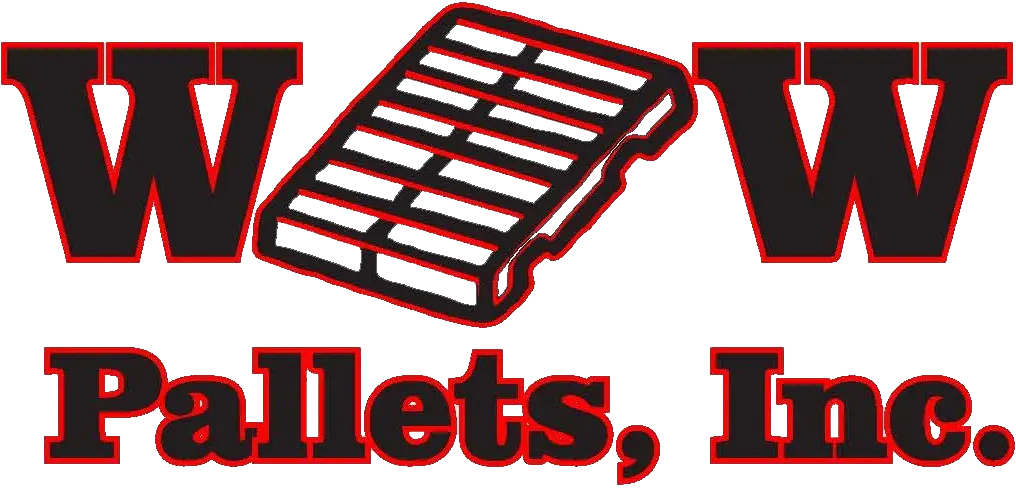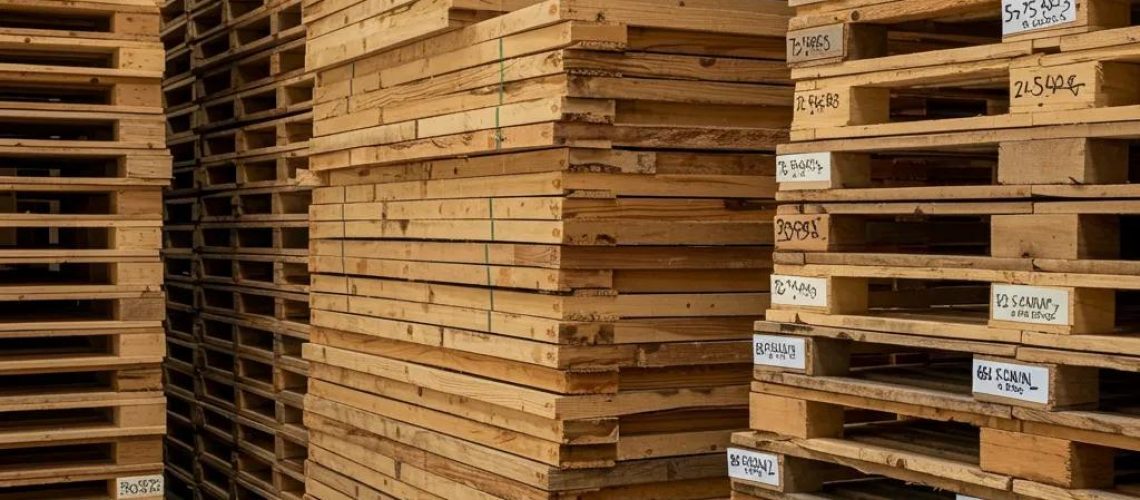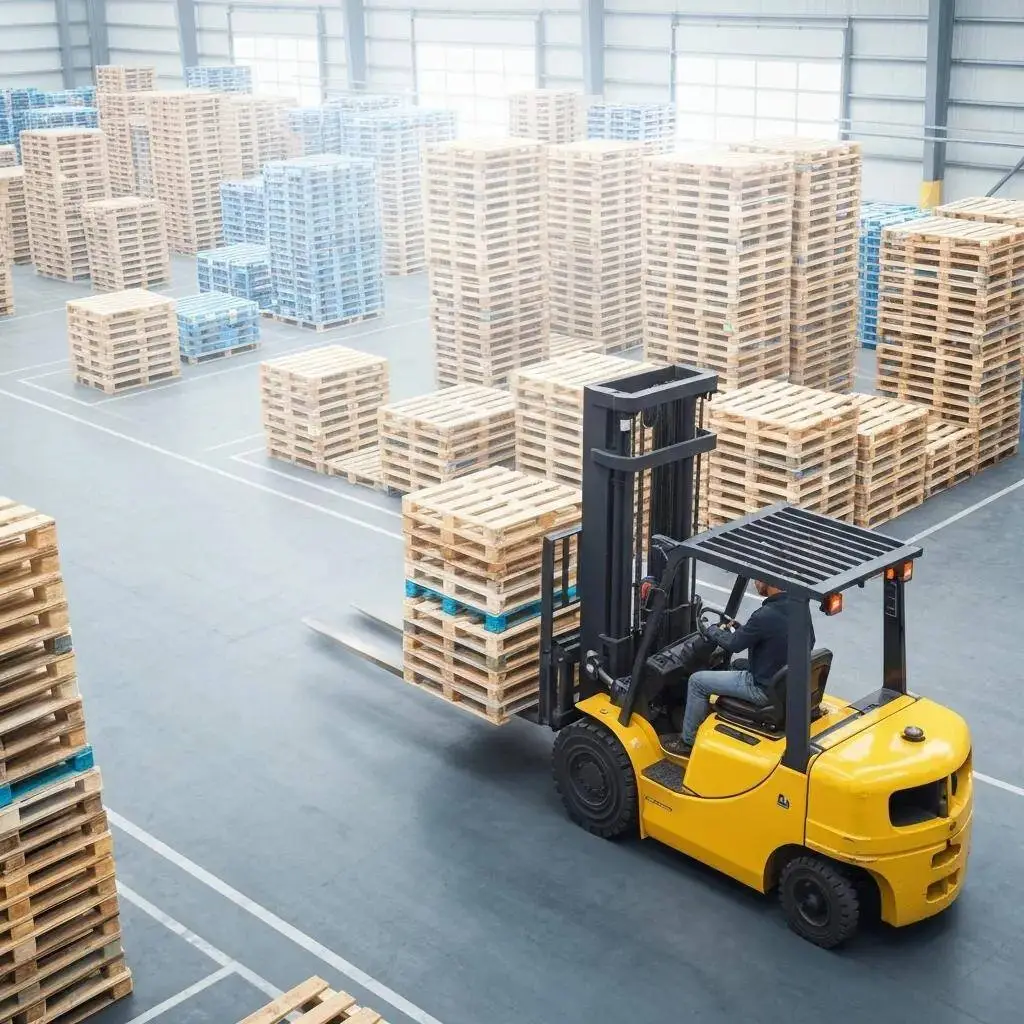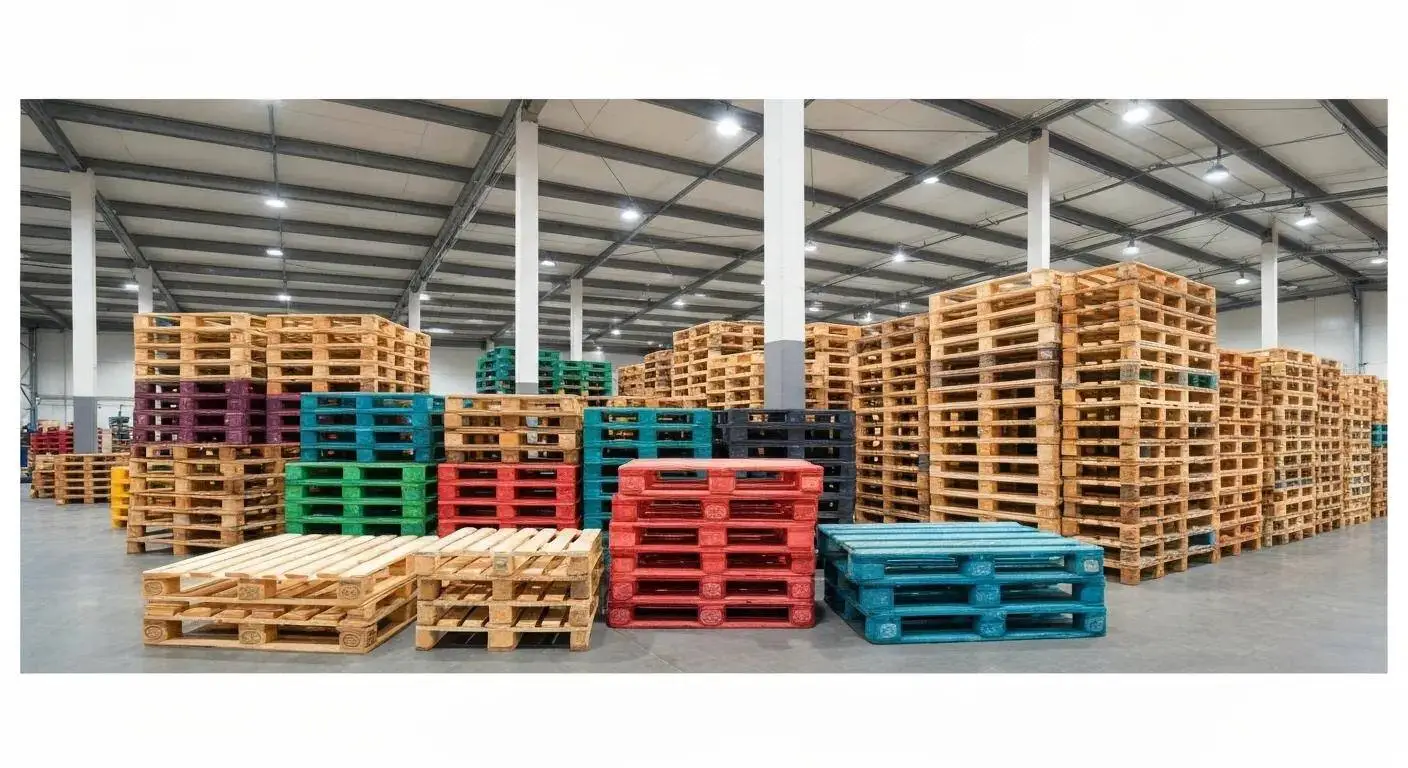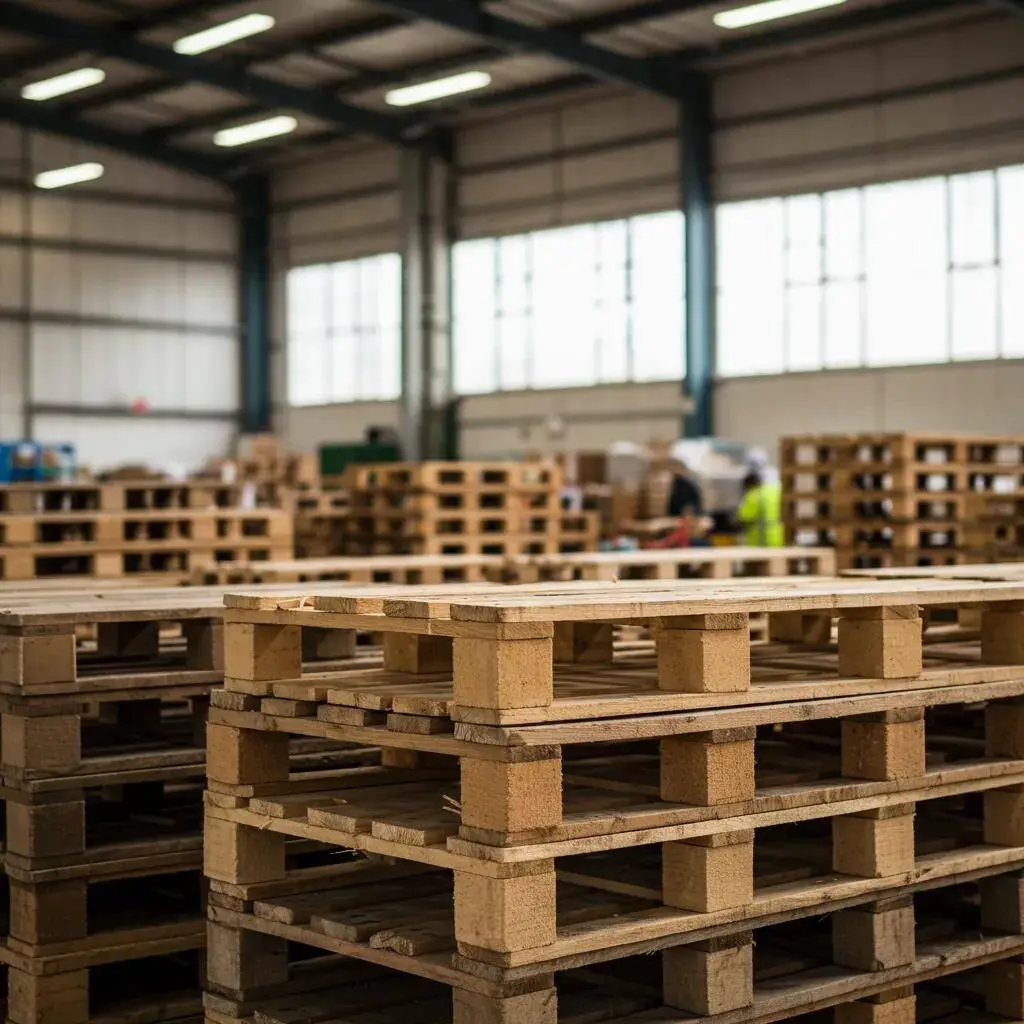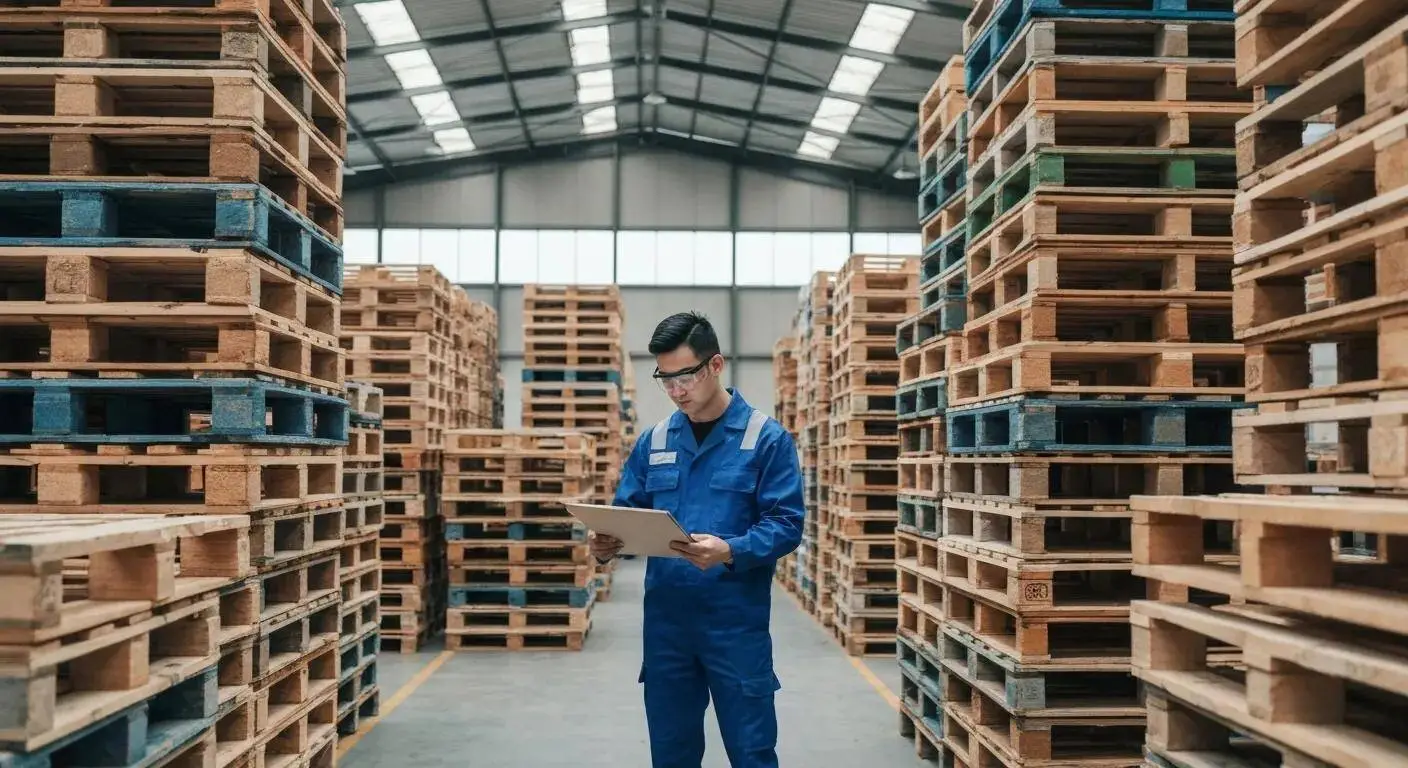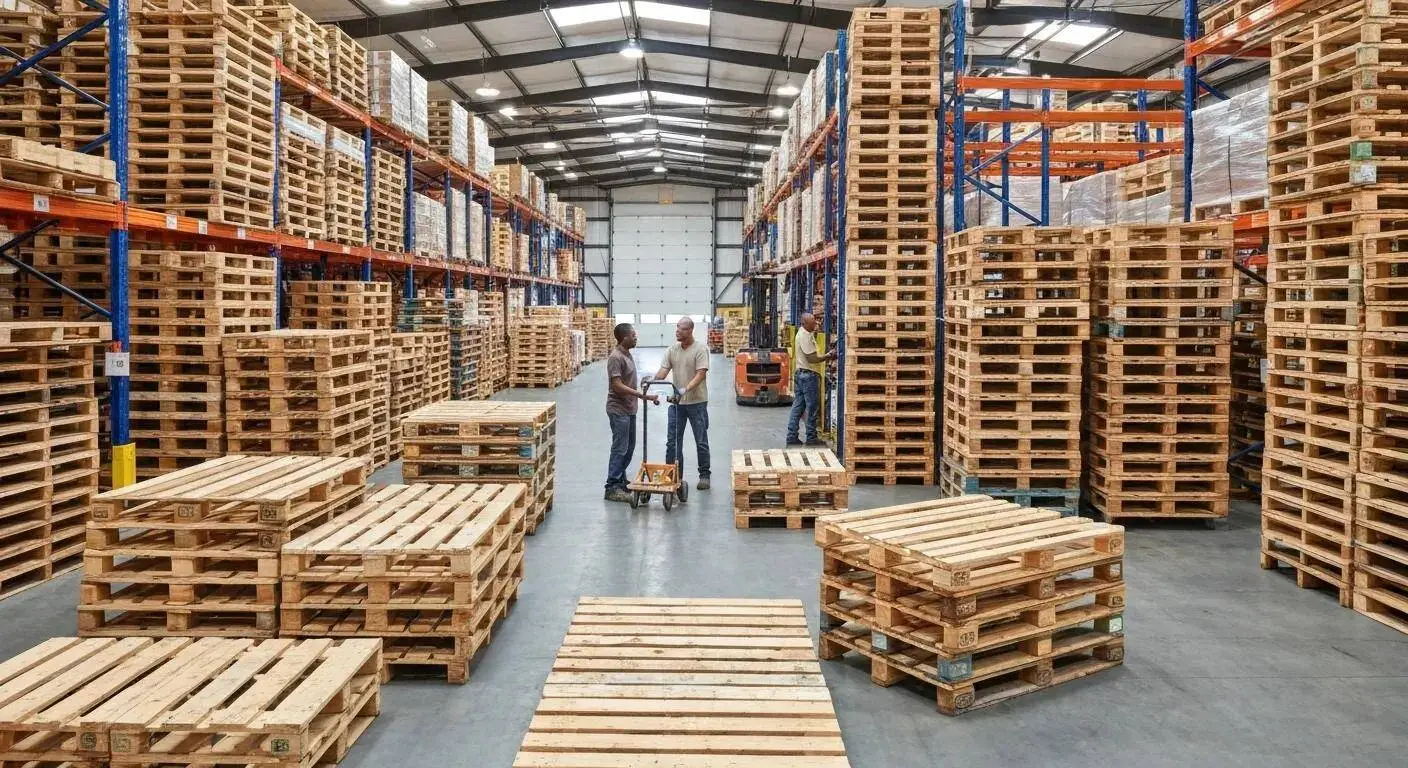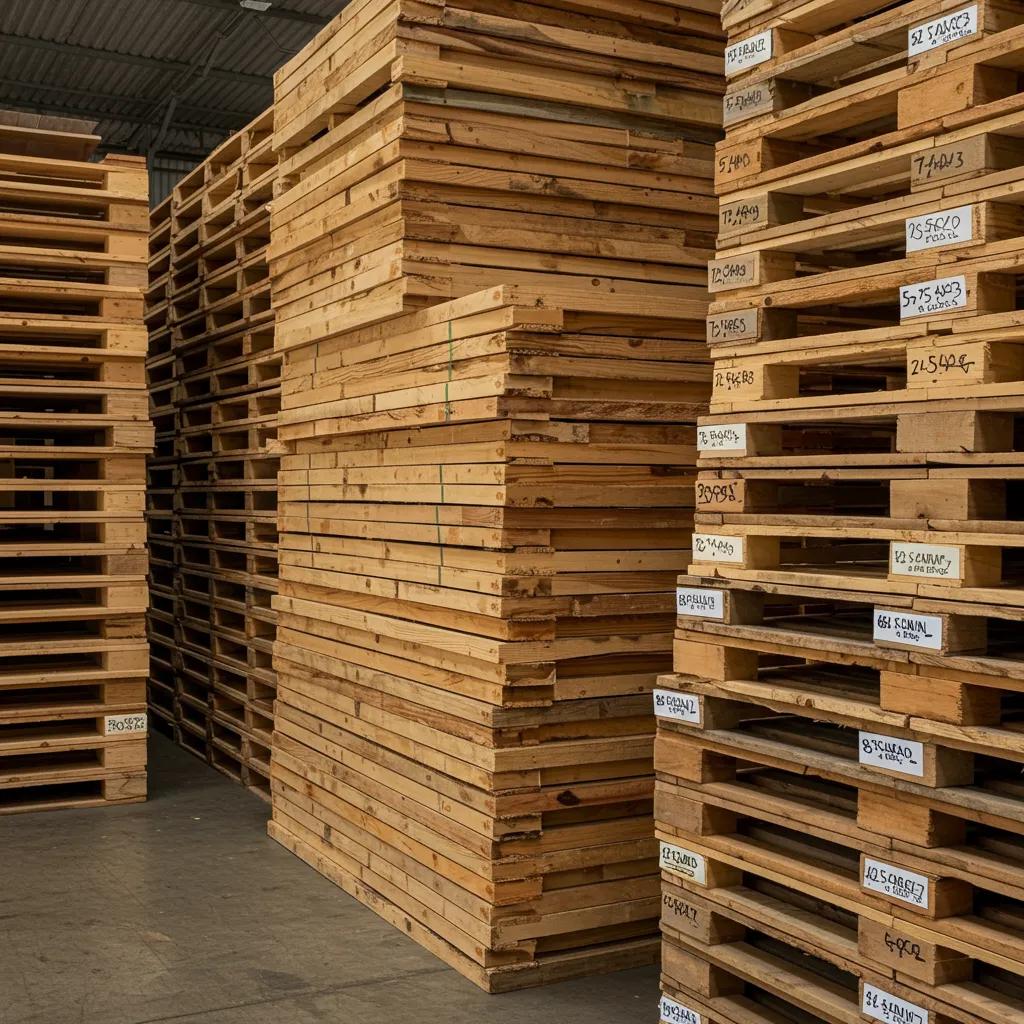
Where to Buy Quality Pallets in Lakeland, FL — A Local Guide for Businesses
This guide explains where Lakeland businesses can buy quality wooden pallets and how to choose suppliers that meet operational, regulatory, and sustainability needs. You will learn the main pallet types available near Lakeland, FL, how to evaluate suppliers, when heat-treated ISPM-15 pallets are required, and practical steps for ordering custom pallets and arranging delivery or recycling. Many local buyers face delays, compliance hurdles for export, and inconsistent pallet quality; this article provides clear, actionable information to reduce risk and improve logistics. The guide maps out pallet types (new, recycled, custom, heat-treated), supplier selection criteria, ordering workflows, complementary services like repair and recycling, and current market trends affecting Lakeland procurement in 2025. By the end you’ll have checklists, comparison tables, and ready-to-use steps to request quotes and schedule deliveries that match Lakeland warehouse, distribution, and export requirements. Keywords covered include wooden pallets Lakeland FL, custom pallets Lakeland FL, heat treated pallets Lakeland, and pallet delivery Lakeland to ensure practical search relevance.
What Types of Quality Wooden Pallets Are Available in Lakeland, FL?
Quality wooden pallets available to Lakeland businesses span several practical categories, each with tradeoffs between durability, cost, and compliance. New wooden pallets provide consistent dimensions and higher load ratings for warehousing, while recycled pallets lower upfront cost and support sustainability goals; custom pallets tailor dimensions and load capacity to specific products, and heat-treated pallets meet phytosanitary export requirements. Understanding these categories helps purchasing managers choose the right pallet type for inventory handling, transport efficiency, or international shipping. The next section breaks each category into construction details, typical specs, and recommended use-cases to guide selection.
What Are New Wooden Pallets and Their Benefits for Lakeland Businesses?
New wooden pallets are built from fresh timber with consistent deck boards and stringers, producing reliable dimensions and predictable load ratings for warehouse racking and automated handling. Because new pallets use uniform materials and nails/fasteners, they reduce product damage and handling variability, which benefits distribution centers and manufacturers that require repeatable stacking and forklift compatibility. Standard sizes such as 48×40 are common, providing optimized cube utilization for many Lakeland shippers, while higher-grade construction supports heavier static and dynamic loads. Choosing new pallets improves inventory control and reduces unexpected replacement frequency, and the next subsection examines cost-saving alternatives in recycled pallets.
How Do Recycled Pallets Offer Cost and Environmental Benefits in Lakeland?
Recycled pallets reuse serviceable deck boards and stringers from previously used units, offering significant upfront cost savings and reducing timber demand compared with buying new pallets. For Lakeland operations with non-critical cosmetic requirements or for one-way distribution, recycled units deliver acceptable load performance when inspected and graded, and they contribute to circular material flows when repair and reuse programs are in place. Recycled pallets may carry more variability in dimensions and lifespan, so buyers should inspect for loose fasteners and cracked boards before deploying them in automation or export. Understanding these tradeoffs helps buyers decide when recycled pallets make sense versus investing in new or custom-built units.
What Custom Wooden Pallet Solutions Can Lakeland Businesses Order?
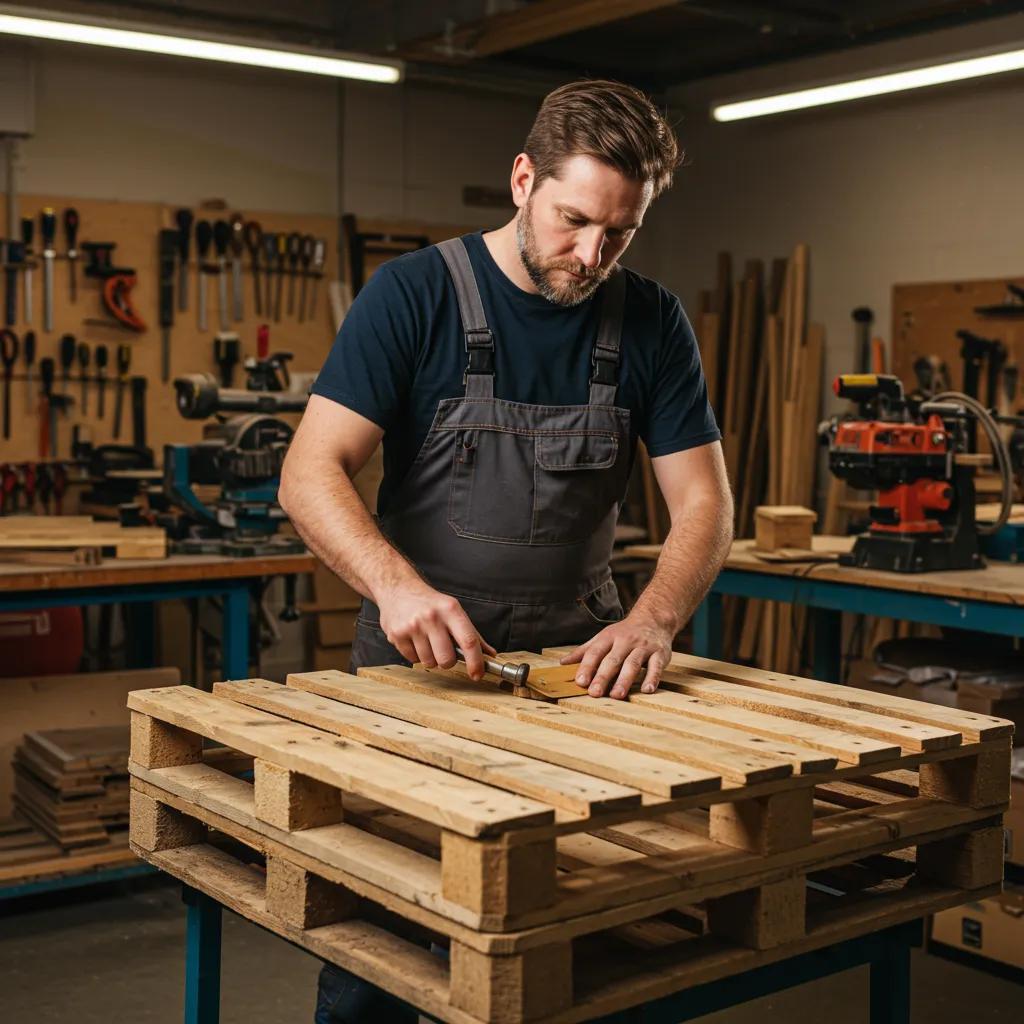
Custom wooden pallets are tailored to specific product dimensions, load ratings, wood species, and marking or notching requirements to match specialized manufacturing, agricultural, or retail packing needs. Common customization options include non-standard footprint dimensions, heavier stringer configurations for higher dynamic loads, runner vs. block designs for conveyor compatibility, and unique stamping or labeling for inventory control. Lead times and minimum order quantities vary by supplier and production schedules, so buyers typically provide drawings, target loads, and shipment frequency to get accurate quotes. A clear specification and sample approval process reduces rework and ensures custom pallets improve shipping and storage efficiency.
Why Choose Heat-Treated Pallets in Lakeland for Export and Compliance?
Heat-treated wooden pallets are thermally processed to meet phytosanitary standards, reducing pest risk and satisfying international import rules that require ISPM-15 treatment for many countries. Heat treatment changes the internal moisture and pest viability through controlled temperature exposure, and treated pallets carry standard markings that customs and regulators recognize to avoid shipment holds. Exporters from Lakeland should plan packaging and pallet selection early to ensure container loading and documentation align with destination-country rules. The following section explains supplier selection criteria that help buyers secure compliant, heat-treated pallet inventory.
| Pallet Type | Typical Sizes | Common Load Rating | Cost Range | Best Use |
|---|---|---|---|---|
| New wooden pallets | 48×40, 42×42, custom | Medium–High (depends on grade) | Moderate–High | Long-term warehousing, racked storage |
| Recycled wooden pallets | 48×40, variable | Low–Medium | Low | One-way shipments, temporary staging |
| Custom wooden pallets | Tailored footprints | Specified by design | Variable | Specialized products, odd geometry |
| Heat-treated (ISPM-15) pallets | Standard or custom | Medium–High | Moderate–High | International export, regulated markets |
This comparison highlights how pallet selection balances size, load capacity, and regulatory needs to match Lakeland business use-cases; next we cover how to evaluate suppliers who deliver these options reliably.
How to Choose the Best Pallet Supplier in Lakeland, FL?
Choosing a pallet supplier requires evaluating capabilities, certifications, logistics support, and local responsiveness so your supply chain stays consistent and compliant. Focus on supplier capabilities like custom fabrication, on-site heat-treating (ISPM-15), adherence to recognized quality standards, delivery fleets, and repair or exchange programs that reduce downtime. Request documentation of standards and examples of past work, compare lead times and minimum orders, and confirm whether local delivery and removal services are available to minimize transportation costs. The next paragraphs provide a practical checklist and a brief example of supplier attributes to prioritize when sourcing pallets in the Lakeland area.
Reliable supplier selection follows a clear checklist of operational and compliance criteria:
- Verify certifications and treatment capability: Confirm the supplier can provide ISPM-15 heat-treated pallets if you export.
- Confirm manufacturing and custom capabilities: Ensure the supplier can produce required dimensions and load ratings.
- Assess logistics and local delivery: Choose suppliers that offer prompt delivery, removal, and repair services in Lakeland.
- Request references and quality samples: Review physical samples and quality grading to validate specifications.
Applying this checklist helps reduce shipment delays and material mismatch; the next subsection outlines a real-world supplier example illustrating these criteria.
What Makes W W Pallets a Trusted Supplier for Lakeland Businesses?
W W Pallets, Inc. is a family-owned and operated supplier based in Plant City that serves Lakeland and the surrounding Central Florida area, offering a range of wooden pallet solutions and on-site services. The company emphasizes adherence to NWPCA construction standards and operates an on-site ISPM-15 certified heat-treating facility, which supports export-ready pallet inventories and reduces the need to coordinate third-party treatment. W W Pallets’ product mix includes new, recycled, custom, and heat-treated wooden pallets, allowing buyers to consolidate sourcing for multiple pallet types and service needs. This supplier example illustrates how selecting partners with both quality standards and on-site treatment capability simplifies procurement for Lakeland exporters and local distributors.
Why Is Local Delivery Important When Buying Pallets in Lakeland?
Local delivery reduces transit times, transportation costs, and scheduling friction for pallet replacement, exchange, and urgent orders that affect warehouse throughput and order fulfillment. Suppliers with delivery fleets serving Lakeland can stage deliveries on short notice, perform on-site inspections, and coordinate returns or exchanges to keep operations moving while reducing deadhead miles and fuel costs. Local delivery also enables faster resolution when pallet specifications need adjustment, allowing buyers to iterate on custom designs and sample approvals more effectively. Understanding local delivery dynamics helps operations managers plan inventory buffers and minimize downtime.
How Do Pallet Quality Standards Like NWPCA Impact Lakeland Buyers?
Pallet quality standards such as NWPCA grading define construction, board thickness, fastening patterns, and acceptable defects, which influences load ratings, racking safety, and exchangeability across supply chains. Buyers who require predictable performance—such as automated handling systems or international shippers—should request NWPCA-compliant construction details to ensure pallets meet expected static and dynamic loads. Asking suppliers about grading, inspection processes, and marking conventions reduces the risk of damaged goods and regulatory delays. The next section describes where Lakeland businesses can source custom pallet solutions that align with these standards.
Where Can Lakeland Businesses Buy Custom Wood Pallets?
Lakeland businesses can source custom wood pallets from local fabricators or regional suppliers that offer tailored manufacturing, design consultation, and sample approval processes to ensure fit with product geometry and handling systems. Custom providers typically require specification details—dimensions, target load, stacking configuration, wood species preferences, and marking/branding—to generate accurate quotes and lead times. Some suppliers also offer engineering support for pallet optimization to reduce freight costs and increase cube utilization. The following subsections provide a step-by-step ordering workflow, industry examples, and measurable efficiency gains from custom pallets.
What Is the Process for Ordering Custom Pallets in Lakeland?
Ordering custom pallets follows a stepwise workflow that begins with clear specifications and ends with delivery and approval samples to confirm performance. Buyers should provide dimensional drawings, expected loads, stacking patterns, shipment frequency, and required markings as the first step, then request a formal quote and sample or prototype for approval. Typical production includes sample approval, production scheduling, heat-treatment if required, and delivery logistics, with lead times varying by complexity and current production loads. Preparing these details up front accelerates quoting and reduces revision cycles during production.
- Provide specifications and expected usage: Share drawings, weights, and stacking plans to start a quote.
- Review quote and request a sample: Approve a physical sample to validate dimensions and performance.
- Schedule production and delivery: Confirm lead times, heat-treatment needs, and delivery scheduling.
Following this process ensures custom pallets meet operational requirements and limits unexpected production delays; the next section highlights which local industries most benefit from custom designs.
Which Industries in Lakeland Benefit Most from Custom Pallet Solutions?
Industries such as food and beverage, agriculture, specialized manufacturing, and distribution centers frequently benefit from custom pallets tailored for product protection, hygiene, or space efficiency. Agricultural shippers may require pallets sized for crates or bins, while manufacturers might request heavier-duty stringers or reinforced decks for heavy machinery components. Retail distribution centers often use custom pallets to maximize trailer cube utilization and reduce handling damage during cross-docking operations. Matching industry needs to custom design choices yields tangible reductions in damage rates and handling time.
How Do Custom Pallets Improve Shipping and Storage Efficiency?
Custom pallets improve efficiency by matching pallet dimensions to product packaging, enabling tighter stacking, fewer voids in transport, and improved cube utilization in trailers and containers. Better-matched pallets reduce shifting and damage during transit, lower handling cycles with optimized forklift engagement, and can extend pallet service life when designed to the actual load profile. Over time, reduced product damage and improved transport efficiency translate into measurable cost savings and lower total cost of ownership for the pallet program. The next part explains heat-treated pallet benefits for export compliance.
| Pallet Service | Attribute | Value |
|---|---|---|
| Delivery | Lead time | Typically next-day to several days depending on distance and order size |
| Removal/Exchange | Workflow | Scheduled pickup or swap programs to manage used pallet flows |
| Repair | Turnaround | Fast repairs using standard board/stringer replacement to extend life |
This service comparison clarifies how integrated logistics and after-sales services reduce operational burden and support continuous pallet availability for Lakeland businesses.
What Are the Advantages of Heat-Treated Pallets in Lakeland, FL?
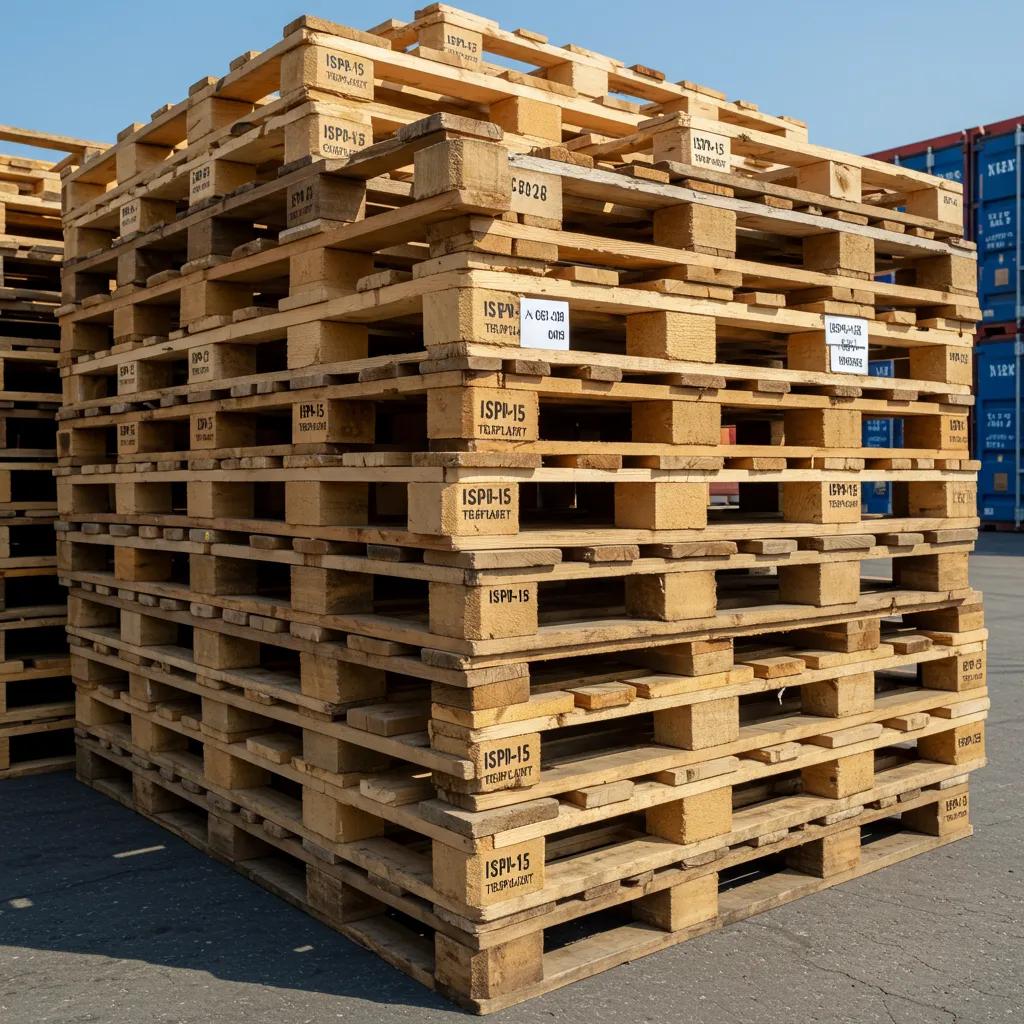
Heat-treated pallets primarily provide phytosanitary compliance, lowering the risk of pest transmission and enabling smooth international shipping where ISPM-15 treatment is required. The heat-treatment process kills wood-boring insects and larvae through controlled temperature exposure, producing a stamped pallet that customs recognize; this reduces the likelihood of shipment holds and costly fumigation or repacking. For Lakeland exporters—particularly in agriculture and manufacturing—heat-treated pallets simplify export documentation and improve predictability when dealing with regulated destinations. The next subsections expand on ISPM-15 certification, treatment steps, and which local businesses commonly require treated pallets.
How Does ISPM-15 Certification Ensure Safe International Shipping?
ISPM-15 certification designates that wooden packaging has undergone approved phytosanitary measures, typically heat treatment, to mitigate the spread of pests between countries, and certified pallets display specific markings recognized by customs officials. This marking and documentation reduce inspection delays, fumigation orders, or outright rejections at destination ports, which preserves shipment schedules and avoids added costs. Buyers requesting ISPM-15 pallets should verify markings on delivered units and request treatment declarations when preparing export paperwork. Confirming certification early in procurement prevents last-minute compliance gaps before containerization.
What Is the Heat Treatment Process Used by Lakeland Pallet Suppliers?
Heat treatment for ISPM-15 compliance involves raising the wood’s core temperature to a specified threshold for a set duration to eliminate pests; facilities with on-site capabilities control time and temperature and track treated batches for verification. On-site treatment streamlines the supply chain because pallets can be manufactured and treated under one roof, reducing handling and transit to third-party treatment sites; this also shortens lead times for export-ready pallets. After treatment, pallets receive standard markings and documentation that buyers can record for export manifests and customs clearance. Verifying markings upon delivery confirms treatment and supports export traceability.
Which Lakeland Businesses Require Heat-Treated Pallets for Export?
Exporters in agriculture, food products, manufactured components, and any company shipping wooden-packed goods internationally typically need heat-treated pallets when destination countries mandate ISPM-15. Firms that consolidate export shipments through ports or freight forwarders should plan pallet treatment in advance to align container stuffing and documentation, and companies performing indirect exports through intermediaries must still ensure pallet compliance. Planning for heat-treated pallets as part of export logistics reduces the risk of rejected shipments and streamlines customs processing, which is critical for time-sensitive exports.
| Heat-Treated Pallet Attribute | Characteristic | Benefit |
|---|---|---|
| Certification | ISPM-15 marking | Recognized by customs, reduces holds |
| Process | Controlled heat to core temperature | Eliminates wood pests |
| Typical Use | International shipments | Ensures export compliance for regulated markets |
This table highlights treatment attributes that directly reduce export risk; next we explore how complementary pallet services support Lakeland businesses beyond initial purchase.
How Do Pallet Services Support Lakeland Businesses Beyond Buying?
Pallet services—delivery, removal, repair, exchange, and recycling—help businesses manage total pallet lifecycle costs and environmental impact while reducing operational friction. Delivery and removal programs streamline inventory flow and avoid overstocking, repair services extend pallet life at lower cost than replacement, exchange programs reduce capital outlay by trading refurbished pallets, and recycling programs convert unusable wood into mulch or other products. Integrating these services with procurement simplifies scheduling and reduces landfill contributions. The following subsections provide operational details for delivery and removal, recycling participation, and the benefits of exchange and repair programs.
What Delivery and Removal Services Are Available for Pallets in Lakeland?
Delivery services for pallets typically include scheduled drops, same-week fulfillment for urgent orders, and coordinated staging for large shipments, while removal services retrieve used pallets for repair, recycling, or exchange. Effective programs offer clear lead times, packaging staging guidelines, and return logistics that reduce on-site handling and storage burden. For Lakeland buyers, aligning delivery windows with production or shipping schedules prevents bottlenecks and reduces truck waiting times at docks. Understanding these scheduling and staging expectations up front improves operational reliability.
- Pallet services reduce inbound handling and staging time through coordinated scheduling.
- Regular removal and exchange programs lower storage needs and handling costs.
- Same-week delivery options help address urgent shortfalls during peak demand.
These service benefits help procurement teams maintain consistent pallet availability and reduce unplanned operational disruptions; the next part discusses recycling participation.
How Can Lakeland Businesses Participate in Pallet Recycling Programs?
Businesses can participate in pallet recycling by arranging scheduled pickups for unusable units, partnering in exchange programs that accept reusable pallets, or directing damaged wood to local recycling streams where it is ground into mulch and other byproducts. Recycling reduces disposal costs, supports local circular economy initiatives, and can generate modest returns from reusable materials. Establishing a routine pickup cadence and clear segregation of reusable vs. non-reusable pallets simplifies the recycling workflow for both supplier and customer. The following subsection outlines operational advantages of repair and exchange programs.
What Are the Benefits of Pallet Exchange and Repair Services Locally?
Pallet exchange programs let businesses trade used but serviceable pallets for refurbished units, reducing capital expenditure and inventory complexity, while repair services replace broken boards and nails to return pallets to service quickly. Typical repairs focus on deck boards, stringer replacement, and re-nailing, with turnaround times that often beat the cost and delay of full replacements. Exchange programs also reduce waste and support sustainability goals by keeping more pallets in circulation. Leveraging local repair and exchange services optimizes total cost of ownership and improves supply chain resilience.
| Service Type | Lead Time | Pricing Model |
|---|---|---|
| Delivery | 1–5 days depending on schedule | Per-order or contract pricing |
| Removal/Exchange | Scheduled pickups | Credit or swap models |
| Repair | 1–3 days typical | Per-pallet or per-board fees |
This table clarifies service timelines and pricing approaches that buyers can expect; next, we discuss benefits of local suppliers.
Why Should Lakeland Businesses Choose Local Pallet Suppliers?
Local pallet suppliers bring faster response times, better knowledge of regional shipping constraints, and often integrated services that reduce freight and handling costs for Lakeland operations. Working with nearby providers shortens lead times for emergency orders and enables hands-on sample approvals for custom designs, while local firms may better coordinate regional delivery routes and removal schedules to lower transport costs. Choosing local partners also supports sustainability through reduced transport emissions and encourages community-based recycling programs. The next subsections explore how local expertise and procurement choices deliver measurable savings and support environmental objectives.
How Does Local Expertise Improve Pallet Solutions for Lakeland Companies?
Local suppliers understand regional logistics factors—climate, common cargo types, and nearby routing constraints—and can recommend pallet materials, coatings, or design tweaks to extend service life under Florida humidity and handling practices. This knowledge enables tailored recommendations like specifying species or board thickness appropriate for repeated moist-weather exposure and helps avoid premature degradation. Local expertise also accelerates troubleshooting when pallet performance issues surface, because on-site visits and rapid sampling are logistically simpler. That operational familiarity makes local partnerships valuable for continuous improvement.
What Cost and Time Savings Come from Buying Pallets Locally in Lakeland?
Purchasing from local suppliers reduces freight distance charges, shortens lead times for replenishment, and lowers the risk of supply chain disruption due to distant production backlogs. Shorter transit times also reduce in-transit damage risk, and easier scheduling for returns or repairs means less downtime for material handling equipment. These combined savings improve working capital and reduce emergency replacement costs. The following subsection connects local sourcing with sustainability outcomes.
How Do Local Suppliers Support Sustainability and Environmental Goals?
Local suppliers often operate recycling and grinding programs that divert damaged wood from landfills into mulch or biomass, and exchange programs extend pallet lifespans to reduce timber consumption. By choosing partners that repair and reuse pallets locally, buyers reduce embodied carbon from manufacturing and transportation and can document sustainability initiatives for stakeholders. These practices also create local circular benefits, turning end-of-life pallets into community resources like landscaping mulch. The next section answers common buyer questions about pallet procurement in Lakeland.
What Are Common Questions About Buying Pallets in Lakeland, FL?
This FAQ-style section addresses routine buyer concerns about certified pallets, handling large orders, obtaining quotes, and standard sizes to streamline procurement decisions for Lakeland businesses. Clear, concise answers minimize back-and-forth and help operations teams prepare accurate specifications to get timely quotes and deliveries. The subsequent subsections provide direct steps and verification tips for ISPM-15 pallets, planning for volume orders, requesting quotes, and choosing sizes and grades.
Where Can I Find ISPM-15 Certified Pallets in Lakeland, FL?
ISPM-15 certified pallets come from suppliers that either have on-site heat-treatment capability or contract with certified treatment facilities; buyers should request the ISPM-15 marking on the pallet and documentation of treatment. On-site treatment is advantageous because it reduces handling and treatment transit time and allows suppliers to control batch verification prior to delivery. When requesting certified pallets, ask for treatment declarations and confirm markings upon receipt to ensure export readiness. Verifying certification before containerization prevents costly holds at destination ports.
Can Lakeland Suppliers Handle Large Pallet Orders Efficiently?
Many regional suppliers plan production schedules and staging options for bulk orders, but capacity depends on manufacturing throughput, available inventory, and treatment facility schedules; planning lead times and staging can ensure timely fulfillment. Buyers should discuss expected volumes, delivery cadence, and any seasonality that affects local supply with suppliers well in advance of peak shipping periods. Staged deliveries and contract arrangements can smooth seasonal demand and secure required inventory levels. Preparing a forecast and flexible delivery windows helps suppliers meet large-order needs reliably.
How Do I Get a Quote for Custom or Heat-Treated Pallets in Lakeland?
To get an accurate quote, provide specific information: pallet dimensions, desired load rating, estimated monthly quantity, required certifications (e.g., ISPM-15), and delivery location or schedule. Including drawings, photos of product packaging, and examples of current pallet issues speeds the quoting process and reduces revisions. Suppliers typically respond within business days with pricing and lead times once they have complete specifications. Comparing quotes should focus on total landed cost, treatment or finishing charges, and delivery or pickup terms.
- Supply detailed specs and volumes: Include dimensions, loads, and expected reorder cadence.
- Request treatment and certification details: Specify ISPM-15 if exporting.
- Compare total landed cost and lead times: Factor in delivery, repair, and exchange options.
These steps ensure quotes reflect real operational costs and allow rapid decision-making; the next subsection lists standard sizes and grade guidance.
What Are the Typical Pallet Sizes and Grades Available in Lakeland?
Common pallet footprints include the standard 48×40 and various square or Euro sizes, with grades ranging from basic utility to higher-grade NWPCA-compliant construction for racked storage and automation. Grade influences allowable defects, board thickness, and load ratings, so buyers choosing pallets for racking or automated conveyors should specify higher-grade construction. Selecting the right size and grade reduces damage and increases compatibility with trailers, conveyors, and warehouse racking. Reviewing grade specs with suppliers clarifies expected lifespan and replacement intervals.
- Common sizes include 48×40 and other standard footprints used in North American logistics.
- Grading ranges from utility (lower cost) to NWPCA-conforming construction (higher reliability).
- Grade selection impacts price, load capacity, and life-cycle replacement needs.
This sizing and grading overview helps buyers balance cost and performance when placing orders; next we examine market trends affecting pallet supply.
How Is the Pallet Market Evolving in Lakeland and Beyond?
The pallet market is shifting toward greater sustainability, automation in manufacturing, and demand growth driven by e-commerce and warehousing, which affects availability and lead times for Lakeland buyers. Recycled and refurbished pallet programs are expanding as buyers prioritize circularity and cost control, while some manufacturers adopt automation and smart-tracking technologies to improve consistency and traceability. Anticipating these trends helps procurement teams plan inventories and explore programmatic partnerships for exchange, recycling, and tech-enabled tracking. The following subsections consider sustainability, automation impacts, and demand outlook for local buyers.
What Are the Latest Trends in Sustainable Pallet Solutions for Lakeland?
Sustainable pallet solutions include increased use of recycled pallets, repair and exchange programs, and converting end-of-life wood into mulch or biomass, which reduces landfill use and supports corporate sustainability goals. Buyers increasingly favor suppliers that document recycling flows and offer exchange credits, aligning procurement decisions with environmental reporting requirements. These initiatives also lower total cost of ownership by extending pallet service life and capturing residual value from used material. The next subsection looks at automation trends.
How Is Automation Impacting Pallet Manufacturing and Supply in Lakeland?
Automation in pallet manufacturing improves dimensional consistency, nail placement, and production throughput, which increases supply reliability and reduces variability that affects automated handling systems. Adoption of RFID tagging and smart-pallet tracking enables better inventory visibility across multi-site operations, helping logistics teams reduce losses and optimize reuse cycles. For Lakeland buyers, automation-driven quality improvements mean fewer rejected pallets and smoother integration with conveyor and robotic systems. Understanding automation capacity helps buyers source pallets that match modern material handling environments.
What Market Growth Can Lakeland Businesses Expect in Pallet Demand?
Pallet demand is influenced by regional warehousing growth, e-commerce expansion, and export volumes; buyers should plan inventories with safety stock and supplier agreements to absorb volatility in 2025 and beyond. Anticipating growth allows businesses to negotiate flexible production slots or contract pricing and to enroll in exchange programs that stabilize supply. Monitoring local industrial trends—warehouse openings, manufacturing expansions, and agricultural export cycles—helps procurement teams adjust orders proactively. The next section explains how to contact and order from a local supplier example.
How to Contact and Order Quality Pallets from W W Pallets in Lakeland, FL?
This section describes practical methods to request quotes, the supplier’s physical location context, and common after-sales services available from a local provider serving Lakeland businesses. For buyers who prefer a consolidated supplier for new, recycled, custom, and heat-treated wooden pallets, using a partner with on-site ISPM-15 capability and NWPCA adherence streamlines procurement and compliance. The following subsections describe the best ways to request quotes, confirm service area coverage from Plant City into Lakeland, and what after-sales support to expect.
What Are the Best Ways to Request a Quote or Consultation?
When requesting quotes, prepare a clear summary of pallet specifications—dimensions, target load, volume, required certification (such as ISPM-15), and desired delivery cadence—to facilitate accurate pricing and lead times. Provide photographs or drawings where possible and ask suppliers to include treatment, finishing, and delivery charges in the quote to compare total landed cost. Typical response times vary, but suppliers with on-site treatment and manufacturing usually provide faster, consolidated quotes because they control production and treatment schedules. A complete quote request accelerates sample approvals and production scheduling.
Where Is W W Pallets Located and What Areas Do They Serve?
W W Pallets, Inc. is based in Plant City, Florida, and serves Lakeland and surrounding Central Florida areas with new, recycled, custom, and heat-treated wooden pallets. Operating as a family-owned and operated business, the supplier provides local coverage that includes manufacturing and on-site ISPM-15 heat-treatment capability to support both domestic distribution and export-ready pallet needs. Working with a supplier located in Plant City reduces transit times into Lakeland and simplifies coordination for delivery, removal, and repair services. The next subsection outlines typical after-sales support buyers can expect.
What Customer Support and After-Sales Services Are Offered?
After-sales services commonly include pallet repair, exchange programs, follow-up quality checks, and assistance with treatment verification and documentation for exports—services that reduce buyer operational burden and total cost of ownership. Suppliers with on-site treatment and repair capabilities can repair pallets quickly, exchange units as part of an ongoing program, and provide documentation for ISPM-15-treated units to support customs clearance. Reliable customer support helps buyers move from reactive replacement ordering to proactive pallet asset management. Ending with practical next steps, buyers should prepare specifications and request consolidated quotes to begin procurement.
